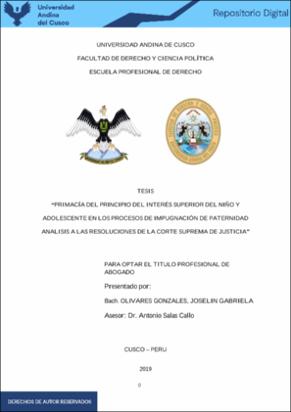| dc.contributor.advisor | Salas Callo, Antonio | |
| dc.contributor.author | Olivares Gonzales, Joselin Gabriela | |
| dc.date.accessioned | 2021-12-14T00:47:35Z | |
| dc.date.available | 2021-12-14T00:47:35Z | |
| dc.date.issued | 2019-12-13 | |
| dc.identifier.uri | https://hdl.handle.net/20.500.12557/4307 | |
| dc.description.abstract | La presente investigación tuvo por objetivo analizar diferentes consultas y sentencias casatorias
de los procesos de impugnación de paternidad por parte de las salas civil de la Corte Suprema
y de las salas constitucional de la Corte Suprema, al notar que ambas salas resuelven bajo una
diferente percepción la aplicación del principio de interés superior del niño en los procesos de
impugnación de paternidad, siendo que en consulta prima la verdad biológica y en sentencia
casatoria prima la verdad legal es así que en la presente se analiza el origen de este proceso de
impugnación, su objetivo, sus efectos y principalmente los criterios constitucionales que desde
primera instancia deben ser evaluados especialmente para resolver estos procesos de
impugnación de paternidad, así mismo cual es el valor probatorio que se le debe dar a la prueba
de ADN en estos procesos, pues como veremos el proceso de impugnación de paternidad no
tiene como fin conocer la identidad biológica, lo que no tiene en cuenta la sala constitucional
de la Corte Suprema.
Lo ultimo nos lleva a desarrollar lo que las salas civil de la Corte Suprema en base a la doctrina
han denominado “identidad dinámica”, en preponderancia con la identidad estática, como ha
de resolver en base a este derecho constitucionalmente reconocido, su origen desde el papel
que tiene RENIEC, la causa de algunas normas en protección al derecho de identidad del
menor, hasta el desarrollo de la identidad del menor a partir del reconcomiendo paterno
voluntario.
Así mismo se hace un análisis del principio de interés superior del niño sobre el que se amparan
las salas constitucional y civil para resolver pero de forma contradictoria, se estudia su
aplicación cuando se eleva a consulta y en instancia casatoria, así como su reconocimiento
normativo internacional y nacional, los derechos de garantiza para el menor y para los procesos
de familia como lo es el de impugnación de paternidad. | es_PE |
| dc.description.abstract | The purpose of the present investigation was to analyze different consultations and random
sentences of the paternity challenge processes by the civil rooms of the Supreme Court and the
constitutional rooms of the Supreme Court, noting that both rooms resolve under a different
perception application of the principle of the best interest of the child in the processes of
paternity challenge, being that in biological consultation the biological truth prevails and in
legal cassary case the legal truth is so that in the present the origin of this process of challenge
is analyzed, its objective, its effects and mainly the constitutional criteria that from the first
instance must be evaluated especially to solve these processes of paternity challenge, as well
as the probative value that the DNA test should be given in these processes, as we will see the
process of paternity challenge is not intended to know the biological identity, which does not
take into account the constitutional chamber of the Supreme Court.
The latter leads us to develop what the civil courts of the Supreme Court based on the doctrine
have called “dynamic identity“, in preponderance with static identity, as it has to resolve based
on this constitutionally recognized right, its origin from the RENIEC's role, the cause of some
norms in protection of the child's right to identity, until the development of the child's identity
from the voluntary parental recognition.
Likewise, an analysis is made of the principle of the best interest of the child on which the
constitutional and civil halls are protected to resolve but in a contradictory way, its
application is studied when it is raised to consultation and in cassation instance, as well as its
international normative recognition and national, the rights of guarantees for the minor and
for family processes such as the challenge of paternity. | en_US |
| dc.format | application/pdf | es_PE |
| dc.language.iso | spa | es_PE |
| dc.publisher | Universidad Andina del Cusco | es_PE |
| dc.rights | info:eu-repo/semantics/openAccess | es_PE |
| dc.rights.uri | https://creativecommons.org/licenses/by-nc-nd/4.0/ | es_PE |
| dc.subject | Interés superior del niño | es_PE |
| dc.subject | Procesos de familia | es_PE |
| dc.subject | Identidad del menor | es_PE |
| dc.title | Primacía del principio del interés superior del niño y adolescente en los procesos de impugnación de paternidad análisis a las resoluciones de la Corte Suprema de Justicia | es_PE |
| dc.type | info:eu-repo/semantics/bachelorThesis | es_PE |
| thesis.degree.name | Abogada | es_PE |
| thesis.degree.grantor | Universidad Andina del Cusco. Facultad de Derecho y Ciencia Política | es_PE |
| thesis.degree.discipline | Derecho | es_PE |
| dc.publisher.country | PE | es_PE |
| dc.subject.ocde | https://purl.org/pe-repo/ocde/ford#5.05.01 | es_PE |
| renati.author.dni | 48039327 | |
| renati.discipline | 421016 | es_PE |
| renati.juror | Jayo Silva, Carlos Eduardo | |
| renati.juror | Olivares Torre, Gretel Roxana | |
| renati.juror | Nuñez Alvarez, Leonidas | |
| renati.juror | Chuquimia Hurtado, José | |
| renati.level | https://purl.org/pe-repo/renati/level#tituloProfesional | es_PE |
| renati.type | https://purl.org/pe-repo/renati/type#tesis | es_PE |


